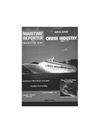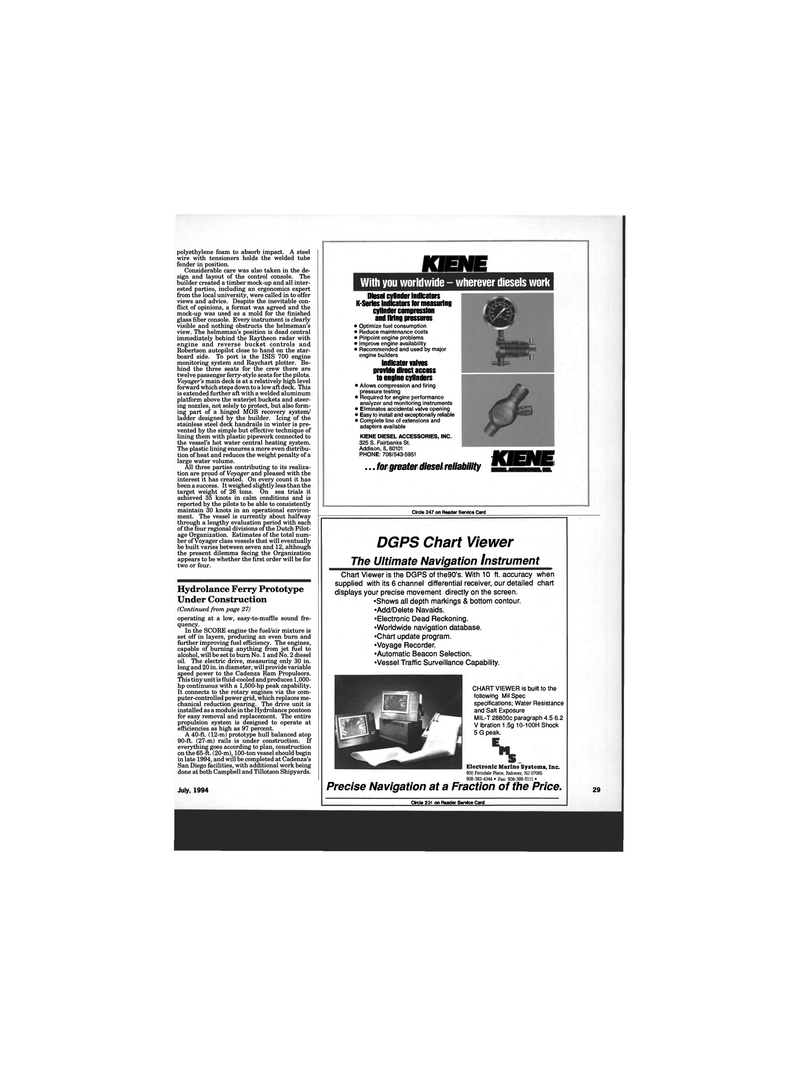
Page 27: of Maritime Reporter Magazine (July 1994)
Read this page in Pdf, Flash or Html5 edition of July 1994 Maritime Reporter Magazine
polyethylene foam to absorb impact. A steel wire with tensioners holds the welded tube fender in position.
Considerable care was also taken in the de- sign and layout of the control console. The builder created a timber mock-up and all inter- ested parties, including an ergonomics expert from the local university, were called in to offer views and advice. Despite the inevitable con- flict of opinions, a format was agreed and the mock-up was used as a mold for the finished glass fiber console. Every instrument is clearly visible and nothing obstructs the helmsman's view. The helmsman's position is dead central immediately behind the Raytheon radar with engine and reverse bucket controls and
Robertson autopilot close to hand on the star- board side. To port is the ISIS 700 engine monitoring system and Raychart plotter. Be- hind the three seats for the crew there are twelve passenger ferry-style seats for the pilots.
Voyager's main deck is at a relatively high level forward which steps down to a low aft deck. This is extended further aft with a welded aluminum platform above the waterjet buckets and steer- ing nozzles, not solely to protect, but also form- ing part of a hinged MOB recovery system/ ladder designed by the builder. Icing of the stainless steel deck handrails in winter is pre- vented by the simple but effective technique of lining them with plastic pipework connected to the vessel's hot water central heating system.
The plastic lining ensures a more even distribu- tion of heat and reduces the weight penalty of a large water volume.
All three parties contributing to its realiza- tion are proud of Voyager and pleased with the interest it has created. On every count it has been a success. It weighed slightly less than the target weight of 26 tons. On sea trials it achieved 35 knots in calm conditions and is reported by the pilots to be able to consistently maintain 30 knots in an operational environ- ment. The vessel is currently about halfway through a lengthy evaluation period with each of the four regional divisions of the Dutch Pilot- age Organization. Estimates of the total num- ber of Voyager class vessels that will eventually be built varies between seven and 12, although the present dilemma facing the Organization appears to be whether the first order will be for two or four.
Hydrolance Ferry Prototype
Under Construction (Continued from page 27) operating at a low, easy-to-muflle sound fre- quency.
In the SCORE engine the fuel/air mixture is set off in layers, producing an even burn and further improving fuel efficiency. The engines, capable of burning anything from jet fuel to alcohol, will be set to burn No. 1 and No. 2 diesel oil. The electric drive, measuring only 30 in. long and 20 in. in diameter, will provide variable speed power to the Cadenza Ram Propulsors.
This tiny unit is fluid-cooled and produces 1,000- hp continuous with a 1,500-hp peak capability.
It connects to the rotary engines via the com- puter-controlled power grid, which replaces me- chanical reduction gearing. The drive unit is installed as a module in the Hydrolance pontoon for easy removal and replacement. The entire propulsion system is designed to operate at efficiencies as high as 97 percent.
A 40-ft. (12-m) prototype hull balanced atop 90-ft. (27-m) rails is under construction. If everything goes according to plan, construction on the 65-ft. (20-m), 100-ton vessel should begin in late 1994, and will be completed at Cadenza's
San Diego facilities, with additional work being done at both Campbell and Tillotson Shipyards.
July, 1994
KIENE
With you worldwide - wherever diesels work
Diesel cylinder indicators K-Series Indicators for measuring cylinder compression and firing pressures • Optimize fuel consumption • Reduce maintenance costs • Pinpoint engine problems • Improve engine availability • Recommended and used by major engine builders
Indicator valves provide direct access to engine cylinders • Allows compression and firing pressure testing • Required for engine performance analyzer and monitoring instruments • Eliminates accidental valve opening • Easy to install and exceptionally reliable • Complete line of extensions and adapters available
KIENE DIESEL ACCESSORIES, INC. 325 S. Fairbanks St.
Addison, IL 60101
PHONE: 708/543-5951 ...for greater diesel reliability KIENE DIESEL ACCESSORIES, INC.
Circle 247 on Reader Service Card
DGPS Chart Viewer
The Ultimate Navigation Instrument
Chart Viewer is the DGPS of the90's. With 10 ft. accuracy when supplied with its 6 channel differential receiver, our detailed chart displays your precise movement directly on the screen. •Shows all depth markings & bottom contour. •Add/Delete Navaids. •Electronic Dead Reckoning. •Worldwide navigation database. •Chart update program. •Voyage Recorder. •Automatic Beacon Selection. •Vessel Traffic Surveillance Capability.
CHART VIEWER is built to the following Mil Spec specifications; Water Resistance and Salt Exposure
MIL-T 28800c paragraph 4.5 6.2
V ibration 1.5g 10-100H Shock 5 G peak.
Electronic Marine Systems, Inc. 800 Ferndale Place. Rahway, NJ 07065 908-382-4344 • Fax: 908-388-5111 •
Precise Navigation at a Fraction of the Price.
Circle 269 on Reader Service Card 29

 26
26

 28
28
